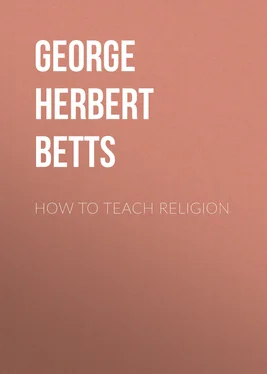George Herbert Betts - How to Teach Religion
Здесь есть возможность читать онлайн «George Herbert Betts - How to Teach Religion» — ознакомительный отрывок электронной книги совершенно бесплатно, а после прочтения отрывка купить полную версию. В некоторых случаях можно слушать аудио, скачать через торрент в формате fb2 и присутствует краткое содержание. Жанр: foreign_prose, Религиозная литература, foreign_religion, foreign_edu, foreign_antique, на английском языке. Описание произведения, (предисловие) а так же отзывы посетителей доступны на портале библиотеки ЛибКат.
- Название:How to Teach Religion
- Автор:
- Жанр:
- Год:неизвестен
- ISBN:нет данных
- Рейтинг книги:5 / 5. Голосов: 1
-
Избранное:Добавить в избранное
- Отзывы:
-
Ваша оценка:
- 100
- 1
- 2
- 3
- 4
- 5
How to Teach Religion: краткое содержание, описание и аннотация
Предлагаем к чтению аннотацию, описание, краткое содержание или предисловие (зависит от того, что написал сам автор книги «How to Teach Religion»). Если вы не нашли необходимую информацию о книге — напишите в комментариях, мы постараемся отыскать её.
How to Teach Religion — читать онлайн ознакомительный отрывок
Ниже представлен текст книги, разбитый по страницам. Система сохранения места последней прочитанной страницы, позволяет с удобством читать онлайн бесплатно книгу «How to Teach Religion», без необходимости каждый раз заново искать на чём Вы остановились. Поставьте закладку, и сможете в любой момент перейти на страницу, на которой закончили чтение.
Интервал:
Закладка:
The teacher of religion should therefore ask himself: "What is my craftsmanship in instruction? Do I know how to present this material so that it will take hold upon my class? Do I know the technique of the recitation hour, and the principles of good teaching? Have I read what the scholars have written and what the experience of others has to teach me. Have I definitely planned and sought for skill? Is my work in the classroom the best that I can make it?"
The teacher must continuously be a student.—The successful teacher of religion must, therefore, be a student. He must continually grow in knowledge and in teaching power. There is no possibility of becoming "prepared" through the reading of certain books and the pursuit of certain courses of study and then having this preparation serve without further growth. The famous Dr. Arnold, an insatiable student until the day of his death, when asked why he found it necessary to prepare for each day's lessons, said he preferred that his pupils "should drink from a running stream rather than from a stagnant pool." This, then, should be the teacher's standard: A broad background of general preparation, constant reading and study in the field of religion and religious teaching, special preparation for each lesson taught .
The churches of each community should unite in providing a school for teacher training. Where the community training school cannot be organized, individual churches should organize training classes for their teachers. Such schools and classes have been provided in hundreds of places, and the movement is rapidly spreading. Wherever such opportunities are available the best church school teachers are flocking to the classes and giving the time and effort necessary to prepare for better service.
Even where no organized training classes are at present available, the earnest teacher can gain much help from following an organized course of reading in such lines as those just given. Excellent texts are available in most of these fields.
The reward.—One deep and abiding satisfaction may come to the teacher who feels the burden of reaching the standards set forth in this lesson. It is all worth while . Some make the mistake of charging against their task all the time, effort and devotion that go into preparing themselves as teachers of religion. But this is a false philosophy. For a great work greatly performed leaves the stamp of its greatness on the worker . All that we do toward making out of ourselves better teachers of childhood adds to our own spiritual equipment. All the study, prayer, and consecration we give to our work for the children returns a hundredfold to us in a richer experience and a larger capacity for service.
1. Recall several teachers whom you remember best from your own pupil days, and see whether you can estimate the qualities in their character or teaching which are responsible for the lasting impression.
2. Are you able to determine from the character chart which are your strongest qualities? Which are your weakest qualities? Just what methods are you planning to use to improve your personality?
3. In thinking of your class, are you able to judge in connection with different ones on what qualities of character they most need help? Are you definitely seeking to help on these points in your teaching?
4. Do you think that church-school teachers could pass as good an examination on what they undertake to teach as day-school teachers? Are the standards too high for day-school teachers? Are they high enough for church-school teachers?
5. Have you seen Sunday-school teachers at work who evidently did not know their Bibles? Have you seen others who seemed to know their Bibles but who were ignorant of childhood? Have you seen others whose technique of teaching might have been improved by a little careful study and preparation? Are you willing to apply these three tests to yourself?
Palmer, The Ideal Teacher.
Hyde, The Teacher's Philosophy.
Slattery, Living Teachers.
Horne, The Teacher as Artist.
CHAPTER II
THE GREAT OBJECTIVE
All teaching has two objectives—the subject taught and the person taught. When we teach John grammar (or the Bible) we teach grammar (or the Bible), of course; but we also teach John . And the greater of these two objectives is John. It is easy enough to attain the lesser of the objectives. Anyone of fair intelligence can master a given amount of subject matter and present it to a class; but it is a far more difficult thing to understand the child—to master the inner secrets of the mind, the heart, and the springs of action of the learner.
Who can measure the potentialities that lie hidden in the soul of a child! Just as the acorn contains the whole of the great oak tree enfolded in its heart, so the child-life has hidden in it all the powers of heart and mind which later reach full fruition. Nothing is created through the process of growth and development. Education is but a process of unfolding and bringing into action the powers and capacities with which the life at the beginning was endowed by its Creator.
The child comes into the world—indeed, comes into the school—with much potential and very little actual capital. Nature has through heredity endowed him with infinite possibilities. But these are but promises; they are still in embryonic form. The powers of mind and soul at first lie dormant, waiting for the awakening that comes through the touch of the world about and for the enlightenment that comes through instruction.
Given just the right touch at the opportune moment, and these potential powers spring into dynamic abilities, a blessing to their possessor and to the world they serve. Left without the right training, or allowed to turn in wrong directions, and these infinite capacities for good may become instruments for evil, a curse to the one who owns them and a blight to those against whom they are directed.
Children the bearers of spiritual culture.—The greatest business of any generation or people is, therefore, the education of its children. Before this all other enterprises and obligations must give way, no matter what their importance. It is at this point that civilization succeeds or fails. Suppose that for a single generation our children should, through some inconceivable stroke of fate, refuse to open their minds to instruction—suppose they should refuse to learn our science, our religion, our literature, and all the rest of the culture which the human race has bought at so high a price of sacrifice and suffering. Suppose they should turn deaf ears to the appeal of art, and reject the claims of morality, and refuse the lessons of Christianity and the Bible. Where then would all our boasted progress be? Where would our religion be? Where would modern civilization be? All would revert to primitive barbarism, through the failure of this one generation, and the race would be obliged to start anew the long climb toward the mountain top of spiritual freedom.
Each generation must therefore create anew in its own life and experience the spiritual culture of the race. Each child that comes to us for instruction, weak, ignorant, and helpless though he be, is charged with his part in the great program God has marked out for man to achieve. Each of these little ones is the bearer of an immortal soul, whose destiny it is to take its quality and form from the life it lives among its fellows. And ours is the dread and fascinating responsibility for a time to be the mentor and guide of this celestial being. Ours it is to deal with the infinite possibilities of child-life, and to have a hand in forming the character that this immortal soul will take. Ours it is to have the thrilling experience of experimenting in the making of a destiny!
Читать дальшеИнтервал:
Закладка:
Похожие книги на «How to Teach Religion»
Представляем Вашему вниманию похожие книги на «How to Teach Religion» списком для выбора. Мы отобрали схожую по названию и смыслу литературу в надежде предоставить читателям больше вариантов отыскать новые, интересные, ещё непрочитанные произведения.
Обсуждение, отзывы о книге «How to Teach Religion» и просто собственные мнения читателей. Оставьте ваши комментарии, напишите, что Вы думаете о произведении, его смысле или главных героях. Укажите что конкретно понравилось, а что нет, и почему Вы так считаете.











